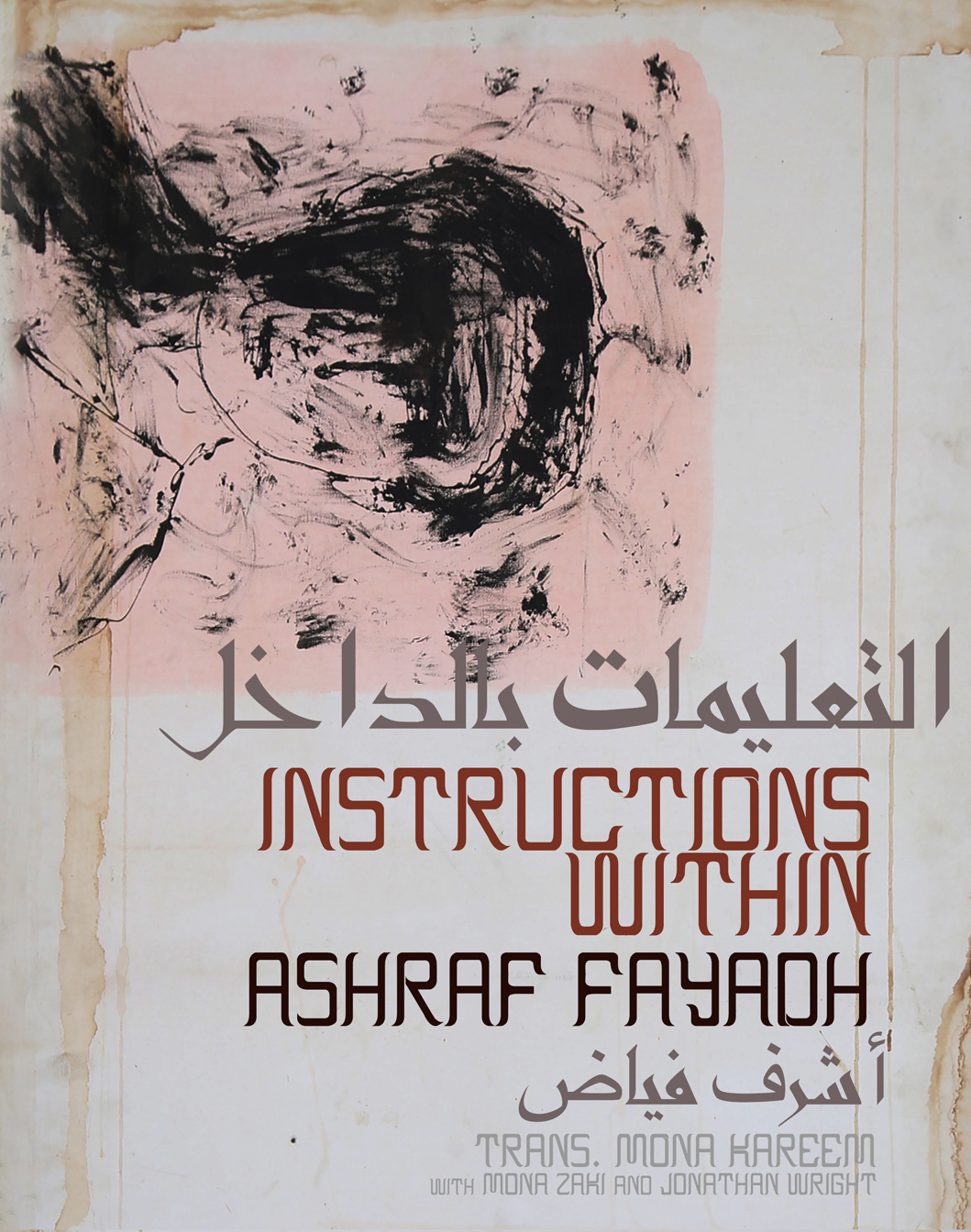Just Out: Ashraf Fayadh’s Instructions Within
Very pleased to be back in New York, despite all — & find my copy of Ashraf Fayadh’s Instructions Within, translated by Mona Kareem (with Mona Zaki & Jonathan Wright) & published by the operating system. And what a rare occasion it is, design-wise: the parti pris of choosing to print this bilingual (Arab-English) edition the way Arabic is read & printed, i.e. from right to left.
Also happy to have been able to lend a hand to Ammiel Alcalay & Lynne Desilva-Johnson in the creation of this important book — a book which comes as a timely reminder that if Ashraf Fayadh’s death sentence on charges of apostasy and promoting atheism was reduced, he is still serving eight years and stands condemned to get 800 lashes.
You can read extracts from the book here & you can search this blog for a number of posts on Ashraf Fayadh’s story. Below some of the endorsements for the book — and the poet, because as Tahar Ben Jelloun has it, “It is the poets who give the earth its salt, its grain of madness, it music and songs…. One remembers the poets, never their judges.”
“Why do you need to read this book in America today? Because a US journalist asked if it really was worth it to write poems that might get you killed. Because Ashraf Fayadh, as poet, artist and human being, is being jailed and tortured for doing his job, that is for daring to expose & deride the two-headed Moloch governing the country he lives in (Saudi Arabia) and ours (these States): Fundamentalist religion & oil-money. Because Ashraf Fayadh is inventing a needed poetics to break not only those taboos but also the shackles of standard Arab poetics, freeing the language—& a freed language is needed for free thinking. Because his own exile (he is of Palestinian extraction) is so absolute that it does not fit the traditional nostalgic poetics of exile & searches for a new way of saying a new & wilder dislocation. Because this exile is so close to all of our own dislocations, even as, smugly ensconced in our North American bunker, we don’t see that the same future is awaiting us. Because he wrote: ‘I am Hell’s experiment on planet Earth.'”—Pierre Joris
“Palestinian poet, artist and cultural activist Ashraf Fayadh reminds us, through his life and work, that blasphemy (for which he has been sentenced to 8 years in prison and 800 lashes) is still a crime in Saudi Arabia, but also that poetry is powerful against the criminal madness of a deranged state: ‘…these pages have exhausted all languages known to earth / …to offer a name that matches your definition of self / your name-like an inkwell pregnant with possibilities.’ The Operating System does us an extraordinary service by making this magnificent poet’s voice available. Read Fayadh to understand what we are fighting against, and for!”—Margaret Randall
“Just a few years before his death, the great poet Amiri Baraka railed against what he saw as a poetry of complacency, of ‘the indoors,’ and harkened back to those of his generation (and older), ‘who actually worked to register some understanding of ‘the great outdoors’ i.e., the real world.’ It is with more than some irony that we here, in the belly of the imperial beast, must seek such poetry of ‘the great outdoors’ from someone like Ashraf Fayadh, a Palestinian imprisoned in Saudi Arabia. Like the real world, Fayadh’s poems are dizzying in their associations and resonance, recalling echoes of lines from different times, languages, and circumstances, from revery to exile, from brutality to utmost tenderness. Poet and artist Etel Adnan once wrote that ‘Palestine is a land planted / by eyes refusing to be closed.’ The poetry of Ashraf Fayadh, in a dream state of vigilance, attention, and horror, forces us to look at the world we actually inhabit, in all its glory and horror.”—Ammiel Alcalay


 Poasis II: Selected Poems 2000-2024
Poasis II: Selected Poems 2000-2024 “Todesguge/Deathfugue”
“Todesguge/Deathfugue” “Interglacial Narrows (Poems 1915-2021)”
“Interglacial Narrows (Poems 1915-2021)” “Always the Many, Never the One: Conversations In-between, with Florent Toniello”
“Always the Many, Never the One: Conversations In-between, with Florent Toniello” “Conversations in the Pyrenees”
“Conversations in the Pyrenees” “A Voice Full of Cities: The Collected Essays of Robert Kelly.” Edited by Pierre Joris & Peter Cockelbergh
“A Voice Full of Cities: The Collected Essays of Robert Kelly.” Edited by Pierre Joris & Peter Cockelbergh “An American Suite” (Poems) —Inpatient Press
“An American Suite” (Poems) —Inpatient Press “Arabia (not so) Deserta” : Essays on Maghrebi & Mashreqi Writing & Culture
“Arabia (not so) Deserta” : Essays on Maghrebi & Mashreqi Writing & Culture “Barzakh” (Poems 2000-2012)
“Barzakh” (Poems 2000-2012) “Fox-trails, -tales & -trots”
“Fox-trails, -tales & -trots” “The Agony of I.B.” — A play. Editions PHI & TNL 2016
“The Agony of I.B.” — A play. Editions PHI & TNL 2016 “The Book of U / Le livre des cormorans”
“The Book of U / Le livre des cormorans” “Memory Rose Into Threshold Speech: The Collected Earlier Poetry of Paul Celan”
“Memory Rose Into Threshold Speech: The Collected Earlier Poetry of Paul Celan” “Paul Celan, Microliths They Are, Little Stones”
“Paul Celan, Microliths They Are, Little Stones” “Paul Celan: Breathturn into Timestead-The Collected Later Poetry.” Translated & with commentary by Pierre Joris. Farrar, Straus & Giroux
“Paul Celan: Breathturn into Timestead-The Collected Later Poetry.” Translated & with commentary by Pierre Joris. Farrar, Straus & Giroux